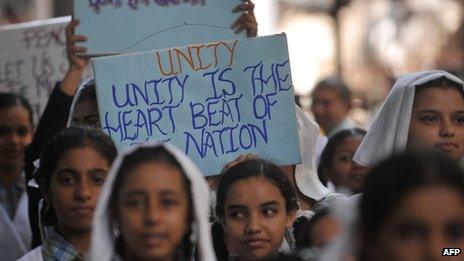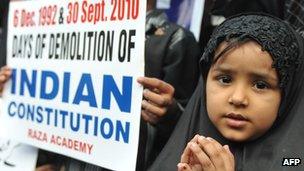Viewpoint: How India moved on from Ayodhya
- Published

The common social bonds between Hindus and Muslims remain intact
Hindu extremism has failed to take hold in India, says writer and historian Patrick French, 20 years after the deadly riots that followed the demolition of the Babri mosque.
When young men with saffron flags stood on the broken dome of the Babri Masjid in Ayodhya in 1992, looking exceptionally pleased with themselves, it appeared that Indian politics had changed.
It was not difficult to find eminent intellectuals who believed hard-line Hindutva (political Hinduism) represented the future. The sheer number of Hindus in India suggested that, if they chose to, radical elements could create a different kind of nation to the diverse, polyphonic one envisaged at independence.
"I love my country and I am proud of its rich and varied heritage," goes the National Pledge, recited daily by schoolchildren. But writing a few months after the events in Ayodhya, the historian Sarvepalli Gopal feared "secularism would be strangled and India would be heading for a fascist take-over… The siege to the basic concepts on which free India has striven to build herself has become more intense."
In the year following the demolition, there were reasons for fear.
Across the nation several thousand people, most of them Muslim, were killed in riots; a series of bombs exploded in Bombay (now Mumbai), orchestrated by a Dubai-based crime and terror mafia; and minorities (including Hindus in far-away Karachi) became the target of persecution.
Fading away
In the view of author VS Naipaul, the passion of the men who had smashed the mosque was a sign of "India striving to regain her soul… in years to come it will be seen as a great moment, and it will probably become a public holiday." In fact, the gist of Indian electoral politics veered away from such destructive action as the years passed.
Back in 1992, two political impulses appeared to be on the rise: self-assertion by disadvantaged castes, external and the use of Hindu identity as a mass rallying cry for voters.
While the first has revolutionised democratic politics, and is still mutating today, Hindutva has faded away as a significant electoral force. There will always be vociferous people who believe that Hindus are a voiceless majority facing insidious persecution from "pseudo-secularists" - but their influence is declining.
Hindu nationalist Bharatiya Janata Party (BJP), external politicians who are strongly associated with Hindutva, such as Lal Krishna Advani, external and Narendra Modi, now spend much of their time trying not to look like extremists.
Mr Advani ostentatiously praised Mohammed Ali Jinnah's "forceful espousal of a secular state" while on a visit to Pakistan in 2005, while Mr Modi is trying to build links to Gujarati Muslim leaders with a view to detoxifying his reputation. The proportion of Muslim policemen in comparison to the general population is higher today in Gujarat than in any other state in India.
At the ballot box, Hindutva consistently plays badly.
During the assembly elections in Uttar Pradesh (UP) earlier this year, the BJP's efforts to use a divisive figure like Uma Bharti, external to promote its cause turned out to be a disaster: rather than offering a vision of the future, she seemed to represent a discredited past.
Even the constituency of Ayodhya itself was lost by the BJP to the regional Samajwadi Party, external, and only three out of every 20 voters across UP plumped for the BJP. The victor in Ayodhya, a student leader named Pawan Pandey, explained his success: "The common man does not believe in false temple politics. Everybody wants development and good governance."
The Ram Janmabhoomi, external movement has lost its appeal for younger voters. It was in retrospect an oddity, a popular historical phenomenon created in part by the mass excitement caused by the television adaptation of the Hindu epic Ramayana in the late 1980s.
Hindu extremism was always a contradiction in terms. Dharma, external comes in innumerable different forms and traditions, and you have to struggle hard to find Hindu texts or training which demand a fundamentalist version of faith. The alternative was to borrow militant strategies from stricter religions like Islam or Christianity.
The mathematics of India's fractionalised electoral map means that issues of caste, region, language, profession and social representation usually take precedence over religion.
Bypassing the state
More significantly, India has become richer since 1992.
Increasingly, voters do not see political parties as the potential answer to their problems. Where possible, they will avoid the state and choose a workaround. Economists will tell you that when individuals have "skin in the game", they are less likely to riot. Communal violence at times of social stress will continue, but it is much less common.

Muslims continue to face discrimination
Contrary to the fears expressed in 1992, the people of India show little sign of wanting either a religious state or a fascist take-over.
Ironically, the greatest threat to the archaeological history of Islam can be found not in Hindu-majority India but in Saudi Arabia.
During the last 20 years, the Ottoman era sites of Mecca and Medina have been destroyed. The house of the Prophet's first wife Khadijah in Mecca has been turned into a public toilet block; the mosque of the Prophet's grandson was blown up; five historic mosques outside Medina have been razed; countless tombs and shrines have been bulldozed by the Saudi authorities, following their austere interpretation of Islam which discourages any risk of "idol worship".
Twenty years after the shock of the Babri Masjid's demolition, Hindu-Muslim relations in India have not been transformed in either a positive or a negative direction.
Muslims continue to face discrimination and under-representation, especially in professions where they have traditionally been absent, such as banking and the higher echelons of the civil service.
But the common social bonds and mutual dependence between communities - upon which India is built - remain intact.